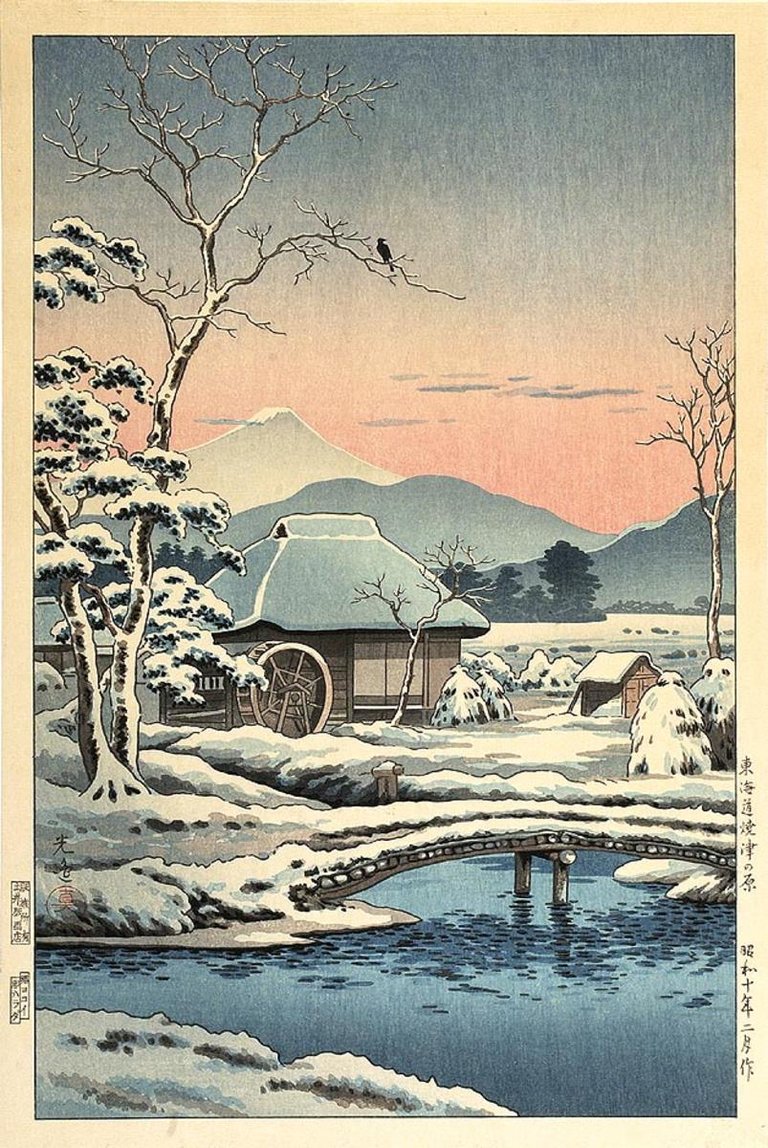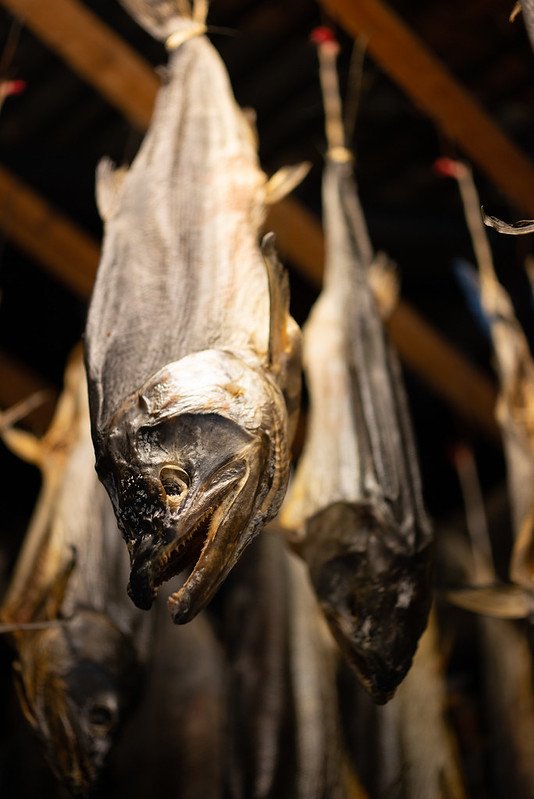I Am Poor ~ Haiku of Japan
It still seems like autumn outside, but by the traditional Japanese reckoning we are into winter now. This in mind, a verse Bashō wrote about 343 years ago comes to mind.
yuki no ashita hitori karazake o kami e tari
by myself
chewing dried salmon
—Bashō


Dried salmon was an ordinary food, far from the luxury of the rich. Bashō is setting himself as a man of the common people, a place he was most comfortable. However, at the same time, he is also setting himself apart from the common people. Let's look at how.
In a headnote to this haiku he tells us:
富家喰肌肉丈夫喫菜根. 予乏し
Fuka wa kiniku o kurai, jofu wa saikon o kissu. Yo wa toboshi.
Wealthy people eat fine meat, and ambitious young men eat roots. I am just poor. (or "I lack both")
The reference to "roots" is a nod to a classic Chinese philosophical text called Saikontan (菜根譚, Caigentan in Chinese) which was very popular in Japan during the Edo era. Written by Kōjisei (Hong Yingming in Chinese), it is a book of aphorisms from Confucianism, Taoism, and Chan (Zen) Buddhism. It is still fairly popular to this day—I've seen it compared in popularity in Japan to Meditations by Marcus Aurelius in the West.
One line from the book tells us that "A man who can get by on roots can achieve anything" (人常咬得菜根, 則百事可做). One can easily guess how people who aspired to great things might take this line literally and adopt the practice of chewing vegetable roots as a way to get there.
Bashō is having a bit of fun poking at both sides. He is denying both riches and ambition. He has no desire for either and prefers to be a poor poet; just as a monk sets all ambition and desire aside in their pursuit of the Buddha, Bashō does the same in is pursuit of poetic purity.
Snow is a kigo (season word) for late winter, roughly 1/6 - 2/3 on our current calendar, but the main kigo here is dried salmon which is a kigo for all winter. Back in the day, salmon would have their guts removed and then be hung to dry under the eaves of buildings and would be eaten all winter.

Licensed under Creative Commons by Yosi Oka
❦
 |
David LaSpina is an American photographer and translator lost in Japan, trying to capture the beauty of this country one photo at a time and searching for the perfect haiku. He blogs here and at laspina.org. |
That is, me! If you like this translation, feel free to use it. Just credit me. Also link here if you can. ↩
You received an upvote of 40% from Precious the Silver Mermaid!
Please remember to contribute great content to the #SilverGoldStackers tag to create another Precious Gem.
I was going to say, salmon must not have been as fancy as it is today. I mean you can still get it kind of cheap, but that smoked stuff is pretty swank. People drinking tea and eating their bagels and lox and stuff.
I think it used to be considered beneath rich folks, kind of like lobster used to be. You read stories about how salmon used to be so common you could just stand by the river when they were swimming back upstream and the river would be so chocked full you could just pick them up. As they became less common the prices went up.
Yeah, I guess that is probably true. We still have some really good salmon streams here in Michigan, but lots of people seem to like the stuff from Alaska and the Farro Islands.
The fear of mercury is driving a lot of that. I don't know if people actually seek out and read the testing results, they just have this general idea that any caught near Alaska must be more safe from pollution.
Haha yeah, that is probably true!
Wow, I learned so much especially about 干鮭. Didn't know about salmon being hung and dried like this to be eaten on winter back in the days.
I think they still are at some Ainu villages up north. But obviously salmon are a little more scarce than they used to be, so this kind of thing isn't as common.
Not This not That.
Between wealth and ambition comes silence, and this silence gets deeper and deeper. Some see this like a lacking situation and some feel it like, they are going away from Materialistic desires.
Exactly!
Interesting! Basho's haiku always provokes deep thoughts in me. Personally, dried salmon is a delicious luxury food. The price of dried salmon is very expensive, making it a fantastic souvenir from Hokkaido. In Ainu culture, salmon holds great importance. They create various products like shoes, dried salmon, oil, my favourite half-raw fish called ruibe, and more. They also traded salmon with Japanese people. I wonder if Basho ever enjoyed trading dried salmon.
As I wanted to express, reading haiku sparked my curiosity about people's lives in ancient times. Sometimes, they thought they were poor and ate genmai rice, but for us, genmai is a superfood, you know. Your haiku selections always give me a nice moment to reflect on Japan's culture. Arigatou!
It is interesting, isn't it? So many foods that used to be considered poor people's food is now considered very healthy and everyone seeks it out. Genmai rice is a great example of this!
I wonder about what you write. In the Edo period, did people in northern Japan ever have any dealings with Ainu people?
I agree! Genmai and mugi rice are very healthy foods! I've heard that Ainu's holy lacquerware and pots were traded with the Japanese.
https://www.tota.world/article/851/#:~:text=The%20Matsumae%20clan%20built%20trading,both%20sides%20of%20the%20exchange.
The verses Bashō wrote are pretty nice verses about the juxtaposition of two personalities and the haiku is such an interesting one with the way you explained it further.
You've received an upvote from the Blockchain Poets account. Thank you for submitting your poem to our community
The poem is very rich, both mundane (the act of chewing) and elevated (snowy morn). Loneliness is palpable.
Or is it? I have a friend who LOVES sardines, and this poem would probably make her very happy. Did Basho love snow? The juxtaposition of snow and sardines in the poem is curious. There are two references to a season in this one, but the second brings us out of the snow and into his quiet home, a fire on the hearth, a tablecloth on the table before him and only him. It's very easy to visualize this one. The feeling one gets is very personal, though.
Great poem! Love your translation.